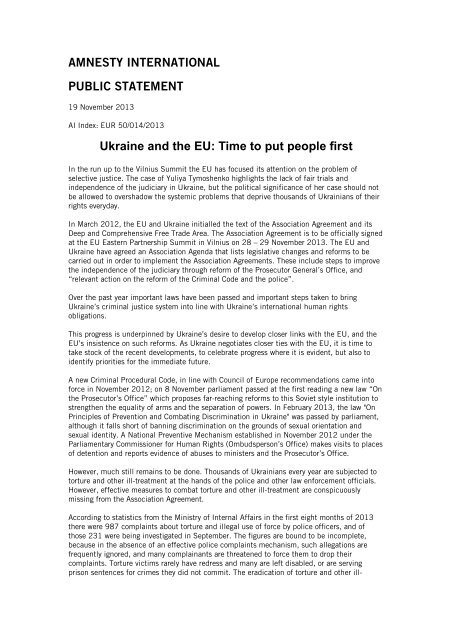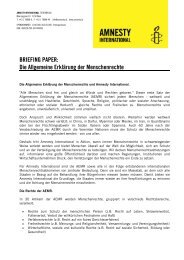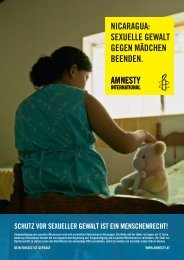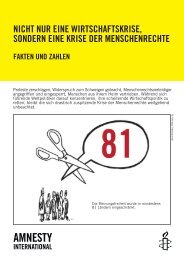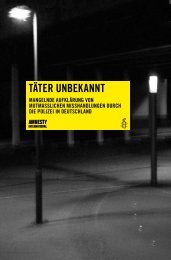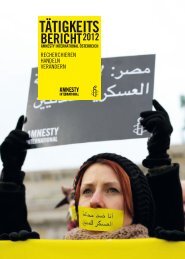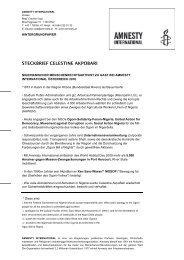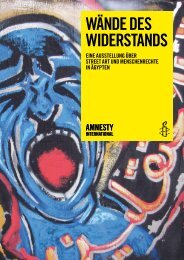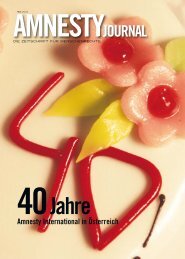AMNESTY INTERNATIONAL PUBLIC STATEMENT Ukraine and the ...
AMNESTY INTERNATIONAL PUBLIC STATEMENT Ukraine and the ...
AMNESTY INTERNATIONAL PUBLIC STATEMENT Ukraine and the ...
Create successful ePaper yourself
Turn your PDF publications into a flip-book with our unique Google optimized e-Paper software.
<strong>AMNESTY</strong> <strong>INTERNATIONAL</strong><strong>PUBLIC</strong> <strong>STATEMENT</strong>19 November 2013AI Index: EUR 50/014/2013<strong>Ukraine</strong> <strong>and</strong> <strong>the</strong> EU: Time to put people firstIn <strong>the</strong> run up to <strong>the</strong> Vilnius Summit <strong>the</strong> EU has focused its attention on <strong>the</strong> problem ofselective justice. The case of Yuliya Tymoshenko highlights <strong>the</strong> lack of fair trials <strong>and</strong>independence of <strong>the</strong> judiciary in <strong>Ukraine</strong>, but <strong>the</strong> political significance of her case should notbe allowed to overshadow <strong>the</strong> systemic problems that deprive thous<strong>and</strong>s of Ukrainians of <strong>the</strong>irrights everyday.In March 2012, <strong>the</strong> EU <strong>and</strong> <strong>Ukraine</strong> initialled <strong>the</strong> text of <strong>the</strong> Association Agreement <strong>and</strong> itsDeep <strong>and</strong> Comprehensive Free Trade Area. The Association Agreement is to be officially signedat <strong>the</strong> EU Eastern Partnership Summit in Vilnius on 28 – 29 November 2013. The EU <strong>and</strong><strong>Ukraine</strong> have agreed an Association Agenda that lists legislative changes <strong>and</strong> reforms to becarried out in order to implement <strong>the</strong> Association Agreements. These include steps to improve<strong>the</strong> independence of <strong>the</strong> judiciary through reform of <strong>the</strong> Prosecutor General’s Office, <strong>and</strong>“relevant action on <strong>the</strong> reform of <strong>the</strong> Criminal Code <strong>and</strong> <strong>the</strong> police”.Over <strong>the</strong> past year important laws have been passed <strong>and</strong> important steps taken to bring<strong>Ukraine</strong>’s criminal justice system into line with <strong>Ukraine</strong>’s international human rightsobligations.This progress is underpinned by <strong>Ukraine</strong>’s desire to develop closer links with <strong>the</strong> EU, <strong>and</strong> <strong>the</strong>EU’s insistence on such reforms. As <strong>Ukraine</strong> negotiates closer ties with <strong>the</strong> EU, it is time totake stock of <strong>the</strong> recent developments, to celebrate progress where it is evident, but also toidentify priorities for <strong>the</strong> immediate future.A new Criminal Procedural Code, in line with Council of Europe recommendations came intoforce in November 2012; on 8 November parliament passed at <strong>the</strong> first reading a new law “On<strong>the</strong> Prosecutor’s Office” which proposes far-reaching reforms to this Soviet style institution tostreng<strong>the</strong>n <strong>the</strong> equality of arms <strong>and</strong> <strong>the</strong> separation of powers. In February 2013, <strong>the</strong> law "OnPrinciples of Prevention <strong>and</strong> Combating Discrimination in <strong>Ukraine</strong>" was passed by parliament,although it falls short of banning discrimination on <strong>the</strong> grounds of sexual orientation <strong>and</strong>sexual identity. A National Preventive Mechanism established in November 2012 under <strong>the</strong>Parliamentary Commissioner for Human Rights (Ombudsperson’s Office) makes visits to placesof detention <strong>and</strong> reports evidence of abuses to ministers <strong>and</strong> <strong>the</strong> Prosecutor’s Office.However, much still remains to be done. Thous<strong>and</strong>s of Ukrainians every year are subjected totorture <strong>and</strong> o<strong>the</strong>r ill-treatment at <strong>the</strong> h<strong>and</strong>s of <strong>the</strong> police <strong>and</strong> o<strong>the</strong>r law enforcement officials.However, effective measures to combat torture <strong>and</strong> o<strong>the</strong>r ill-treatment are conspicuouslymissing from <strong>the</strong> Association Agreement.According to statistics from <strong>the</strong> Ministry of Internal Affairs in <strong>the</strong> first eight months of 2013<strong>the</strong>re were 987 complaints about torture <strong>and</strong> illegal use of force by police officers, <strong>and</strong> ofthose 231 were being investigated in September. The figures are bound to be incomplete,because in <strong>the</strong> absence of an effective police complaints mechanism, such allegations arefrequently ignored, <strong>and</strong> many complainants are threatened to force <strong>the</strong>m to drop <strong>the</strong>ircomplaints. Torture victims rarely have redress <strong>and</strong> many are left disabled, or are servingprison sentences for crimes <strong>the</strong>y did not commit. The eradication of torture <strong>and</strong> o<strong>the</strong>r ill-
treatment requires legislative changes as well as systemic reforms to <strong>the</strong> criminal justicesystem. The Ukrainian government has taken important steps, but until each <strong>and</strong> everyallegation of torture is promptly, effectively <strong>and</strong> independently investigated, <strong>and</strong> <strong>the</strong>perpetrators are brought to justice, torturers will continue to act with impunity.Progress to date on combating tortureThe new Criminal Procedural Code significantly improves safeguards for detainees; it clarifiesthat detention starts from <strong>the</strong> moment of apprehension by <strong>the</strong> police; that detainees have <strong>the</strong>right to a lawyer <strong>and</strong> to an independent medical expert from that moment; <strong>and</strong> clearly statesthat pre-trial detention should only be applied in exceptional circumstances. It also providesfor automatic review of <strong>the</strong> continuing justification for pre-trial detention at two-monthlyintervals <strong>and</strong> stipulates that formal confessions made to police outside <strong>the</strong> court are no longeradmissible in court thus reducing one incentive for police to resort to torture <strong>and</strong> o<strong>the</strong>r illtreatmentfor “investigative” purposes. The numbers of suspects held in pre trial detention hasdropped significantly, <strong>and</strong> a new legal aid system promises to improve access to a lawyer fordetainees. The new Code also introduced limited jury trials for crimes that carry lifeimprisonment, <strong>and</strong> <strong>the</strong> benefits of this reform can be seen in <strong>the</strong> case of Oleks<strong>and</strong>rBondarenko – <strong>the</strong> first verdict to be passed by a jury in recent Ukrainian history.THE CASE OF OLEKSANDR BONDARENKOThe case of Oleks<strong>and</strong>r Bondarenko illustrates <strong>the</strong> progress that has been made, but also pointsout <strong>the</strong> ongoing systemic failings in <strong>the</strong> criminal justice system.Oleks<strong>and</strong>r Bondarenko, from Stetsivka in Sumy region, was detained by police officers fromSumy district police station on 6 October 2012. They took him to an animal fodder plant inStetsivka <strong>and</strong> tortured him to force him to confess to <strong>the</strong> murder of two elderly women in <strong>the</strong>village. Police officers attached electrodes to his legs <strong>and</strong> gave him electric shocks. Theyforced him to wear a gas mask <strong>and</strong> <strong>the</strong>n closed off <strong>the</strong> air to repeatedly bring him close tosuffocation. They forced him to write a confession under dictation which he later recanted incourt.On 25 October 2013, <strong>the</strong> Zarichny district court in Sumy, composed of a jury in accordancewith <strong>the</strong> new Criminal Procedural Code, acquitted Oleks<strong>and</strong>r Bondarenko on <strong>the</strong> basis that<strong>the</strong>re had been serious human rights violations in <strong>the</strong> conduct of <strong>the</strong> police investigation. Thecourt recognized that police officers had arbitrarily detained him, tortured him to force him toconfess to murder, fabricated evidence to incriminate him, <strong>and</strong> also attempted to impose alawyer on Oleks<strong>and</strong>r Bondarenko.In speaking to Amnesty International, Olex<strong>and</strong>ra Kovalova, <strong>the</strong> lawyer defending Oleks<strong>and</strong>rBondarenko said: “This decision is significant because it shows that we can no longer work in<strong>the</strong> old way, we have started to work in a new adversarial way.”Amnesty International welcomes this verdict as a demonstration of <strong>the</strong> independence of <strong>the</strong>judge <strong>and</strong> jury, <strong>and</strong> <strong>the</strong>ir ability to robustly review <strong>the</strong> evidence presented in court. Oleks<strong>and</strong>rBondarenko was uniquely fortunate, he had a competent lawyer, who insisted on his right to ajury under <strong>the</strong> new Criminal Procedural Code. <strong>Ukraine</strong> must strive to ensure that such casesare not <strong>the</strong> exception but <strong>the</strong> norm.Oleks<strong>and</strong>r Bondarenko was acquitted of murder on 25 October 2013, but his initial complaint,made on 25 October 2012, about <strong>the</strong> torture he had suffered at <strong>the</strong> h<strong>and</strong>s of <strong>the</strong> Sumy policewas ignored <strong>and</strong> he spent a year in pre-trial detention. He had complained about <strong>the</strong> torture<strong>and</strong> o<strong>the</strong>r ill-treatment to which he was subjected by police officers on <strong>the</strong> night of 6 – 7October. A criminal investigation was initiated into <strong>the</strong> allegations, but on 30 September2013, <strong>the</strong> criminal investigation was closed. The prosecutor supervising <strong>the</strong> investigation didnot take into consideration a forensic report of 7 November 2012 that found injuries
consistent with Oleks<strong>and</strong>r Bondarenko’s allegations, but only referred to a much later forensicreport dated 23 April 2013 which found no injuries compatible with his allegations. None of<strong>the</strong> potential witnesses were questioned, <strong>and</strong> <strong>the</strong> case was closed on <strong>the</strong> basis of interviewsconducted with <strong>the</strong> same police officers who were suspected of having tortured Oleks<strong>and</strong>rBondarenko. In an interview with Amnesty International he lamented that when he firstcomplained of <strong>the</strong> torture <strong>the</strong>re had been no interest in his case. Sadly, <strong>the</strong> torture he sufferedis not unique.While serving as a positive example of how <strong>the</strong> recent changes in <strong>the</strong> Ukrainian criminaljustice system can help defend human rights, <strong>the</strong> case also highlights entrenched problems in<strong>the</strong> investigation of torture <strong>and</strong> o<strong>the</strong>r ill-treatment by law enforcement officers.Amnesty International calls on <strong>the</strong> Ukrainian government to ensure that <strong>the</strong>se allegations oftorture <strong>and</strong> o<strong>the</strong>r ill-treatment <strong>and</strong> o<strong>the</strong>r human rights violations by <strong>the</strong> police investigatorsworking on this case are promptly, independently <strong>and</strong> effectively investigated, <strong>and</strong> that <strong>the</strong>perpetrators are brought to justice. Oleks<strong>and</strong>r Bondarenko must be offered compensation <strong>and</strong>redress for <strong>the</strong> human rights violations he has suffered.Continuing impunity for torture <strong>and</strong> o<strong>the</strong>r ill-treatmentDespite <strong>the</strong> reforms of <strong>the</strong> new Criminal Procedural Code, people in <strong>Ukraine</strong> continue to suffertorture <strong>and</strong> o<strong>the</strong>r ill-treatment at <strong>the</strong> h<strong>and</strong>s of law enforcement officers who are acting with <strong>the</strong>knowledge of <strong>the</strong>ir own impunity.The new Criminal Procedural Code removes an important incentive for torture by stipulatingthat formal confessions made to <strong>the</strong> police in custody outside <strong>the</strong> court are no longeradmissible in court, however, as Amnesty International’s research demonstrates, extracting aconfession is not <strong>the</strong> only reason why police officers resort to torture <strong>and</strong> o<strong>the</strong>r ill-treatment.Amnesty International continues to document cases where police have tortured individuals topunish <strong>the</strong>m without going to court, in retaliation for a complaint against officials, or in orderto extort money. Oleks<strong>and</strong>r Popov was tortured by police officers in October 2012, as apossible witness, <strong>and</strong> was never charged with any crime.THE CASE OF OLEKSANDR POPOVOleks<strong>and</strong>r Popov was detained by four plain clo<strong>the</strong>d policemen at about 9am on 16 October2012 in Mariupol. Police officers h<strong>and</strong>cuffed him, forced a plastic bag over his head <strong>and</strong>drove him to a forest where <strong>the</strong>y electrocuted him for several hours, using different voltages,intermittently through his feet <strong>and</strong> little fingers. He was asked a series of questions inconnection with a murder investigation. Between 5 <strong>and</strong> 6pm he was taken to Mariupol Citypolice station, but his presence in <strong>the</strong> station was not registered in violation of <strong>the</strong> CriminalProcedural Code. He was transferred to Illichivskiy District police station at about 6pm wherehis presence was properly recorded, <strong>and</strong> he was formally interviewed before release. On 17October Oleks<strong>and</strong>r Popov <strong>and</strong> his bro<strong>the</strong>r submitted a complaint to <strong>the</strong> Mariupol Prosecutor’sOffice. On 21 November an investigation was opened into “abuse of power with violence”under Part 2 of Article 365 of <strong>the</strong> Criminal Code. On 13 March 2013 <strong>the</strong> prosecutor closed<strong>the</strong> case on <strong>the</strong> basis that <strong>the</strong> police officers’ testimony contradicted Oleks<strong>and</strong>r Popov’stestimony. Popov appealed against this decision, <strong>and</strong> in May 2013 <strong>the</strong> court of Voroshylivskyydistrict in Donetsk overturned <strong>the</strong> prosecutor’s decision <strong>and</strong> <strong>the</strong> case is now being investigatedat a higher level by Donetsk Region Prosecutor’s office.Investigations into crimes by officials, <strong>and</strong> in particular by law enforcement officers, continueto fall short of <strong>the</strong> st<strong>and</strong>ards of independence, adequacy, promptness, public scrutiny <strong>and</strong>victim involvement required by <strong>the</strong> European Court of Human Rights. This failure – even whenso vividly exposed in court as in Oleks<strong>and</strong>r Bondarenko’s case - is a persistent <strong>and</strong> deplorablefeature of <strong>the</strong> Ukrainian criminal justice system. It should be <strong>the</strong> focus of <strong>the</strong> immediatereforms, <strong>and</strong> of <strong>the</strong> EU’s pressure.
The following case of two sixteen-year olds beaten by police in Ternopil demonstrates <strong>the</strong> pricepaid by ordinary Ukrainians because of entrenched impunity. One was detained <strong>and</strong> beatenrepeatedly by police officers for no apparent reason o<strong>the</strong>r than <strong>the</strong> fact that he failed topresent <strong>the</strong>m with identification documents when he was on <strong>the</strong> street with friends at 9.30pm.A week later ano<strong>the</strong>r youth was beaten by <strong>the</strong> same police officers as he returned home withhis mo<strong>the</strong>r. An investigation is underway, but <strong>the</strong> police officers are still on active duty.THE BEATING OF TWO SIXTEEN-YEAR OLDS IN TERNOPILYaroslav Gizhovsky was outside a shop near his home in Ternopil with a friend at 9.30pm on30 August 2013 when two police officers approached <strong>the</strong>m <strong>and</strong> asked for <strong>the</strong>ir documents.The two police officers were joined by two more in a patrol car. Yaroslav did not have hisdocuments <strong>and</strong> said that he was not obliged to carry his documents with him. He reported thatone of <strong>the</strong> police officers <strong>the</strong>n tried to grab his arm, <strong>and</strong> when he objected he was pushed into<strong>the</strong> back seat of <strong>the</strong> police car. Yaroslav told a local human rights group <strong>the</strong> following day tha<strong>the</strong> was in shock from <strong>the</strong> pain in his arm: “The pain was unbearable, it is very difficult toexplain. I shouted “help!” <strong>and</strong> <strong>the</strong> car started very quickly. They started to punch me on <strong>the</strong>head <strong>and</strong> <strong>the</strong> o<strong>the</strong>r punched me in <strong>the</strong> side.” Yaroslav was held at <strong>the</strong> police station for 2-3hours, <strong>and</strong> during that time he said he was repeatedly taken to <strong>the</strong> toilet <strong>and</strong> beaten. When heshouted that he wanted to phone his parents <strong>and</strong> that <strong>the</strong> police had no right to treat him inthat way, he was laughed at. His parents were only notified after several hours by an employeeof <strong>the</strong> Ministry of Internal Affairs Division for Children’s Rights. When his parents arrived hewas taken to a psychiatric hospital for assessment <strong>and</strong> <strong>the</strong>n released. The police claimed tha<strong>the</strong> suffers from epilepsy <strong>and</strong> that he had fallen <strong>and</strong> injured himself, although he has neversuffered from this condition, <strong>and</strong> recent medical reports confirmed that he does not sufferfrom epilepsy. Yaroslav complained about <strong>the</strong> ill-treatment <strong>the</strong> following day, but <strong>the</strong>investigation was briefly opened <strong>and</strong> <strong>the</strong>n closed. Yaroslav required treatment in hospital forconcussion, <strong>and</strong> continues to suffer headaches <strong>and</strong> impaired vision. His mo<strong>the</strong>r told AmnestyInternational that one doctor told her that she would get nowhere with her complaint against<strong>the</strong> police <strong>and</strong> refused to treat Yaroslav.Eight days after this event on 7 September, 16 year old Oleks<strong>and</strong>r Kovtun was returning homewith his mo<strong>the</strong>r at 11pm, when he was detained by <strong>the</strong> same police officers who hadreportedly ill-treated Yaroslav Gizhovsky. He was walking ahead of his mo<strong>the</strong>r when he wasapproached by <strong>the</strong> two police officers, <strong>and</strong> when he attempted to turn back towards his mo<strong>the</strong>r<strong>the</strong> police officers threw him to <strong>the</strong> ground <strong>and</strong> beat him. The police officers <strong>the</strong>n called anambulance claiming that he was drunk, but at <strong>the</strong> hospital <strong>the</strong>y were directed to <strong>the</strong>psychiatric hospital where Oleks<strong>and</strong>r was given sedatives <strong>and</strong> made to sleep. On 8 September,when he awoke he realized that his arm was very painful. He was discharged from <strong>the</strong>psychiatric hospital <strong>and</strong> went to <strong>the</strong> emergency hospital with his mo<strong>the</strong>r where doctorsdiagnosed a broken arm <strong>and</strong> treated him. The police arrived at <strong>the</strong> hospital at 4pm <strong>and</strong> tookhim <strong>and</strong> his mo<strong>the</strong>r to <strong>the</strong> police station where he was threatened <strong>and</strong> forced to sign astatement that he had been drunk <strong>and</strong> that he had fallen <strong>and</strong> injured himself.The Ternopil Human Rights Group started to publicize both cases, <strong>and</strong> Oleks<strong>and</strong>r Kovtuncomplained to a Kyiv based NGO, <strong>the</strong> Association of Ukrainian Human Rights Monitors on LawEnforcement, who arranged for a delegation from <strong>the</strong> Ombudsperson’s office to visit Ternopil<strong>and</strong> investigate <strong>the</strong> allegations. During <strong>the</strong>ir visit staff from <strong>the</strong> Ombudsperson’s officediscovered that <strong>the</strong> investigation into Yaroslav Grizhovsky’s allegations had been closed. Onlyunder pressure from <strong>the</strong> local human rights group <strong>and</strong> <strong>the</strong> Ombudsperson’s office did <strong>the</strong> localprosecutor resume <strong>the</strong> investigation.Amnesty International calls on <strong>the</strong> Ukrainian authorities to demonstrate strong politicalcommitment to fight impunity, <strong>and</strong> to build on <strong>the</strong> progress achieved with <strong>the</strong> introduction of<strong>the</strong> new Criminal Procedural Code by ensuring that police officers are given a clear messagefrom <strong>the</strong> highest level that all offences – from minor offences to torture <strong>and</strong> o<strong>the</strong>r ill-treatment- will be met with appropriate sanctions.
The urgent need for an effective State Investigation BureauAbuse by officials can only be prevented when <strong>the</strong>y know <strong>the</strong>y will be effectively held toaccount for <strong>the</strong>ir actions. As well as removing <strong>the</strong> incentive for torture, <strong>the</strong>re must be a strongdeterrent – <strong>the</strong> certainty of disciplinary <strong>and</strong>/or criminal punishment.Article 216 of <strong>the</strong> new Criminal Procedural Code provides for a State Investigation Bureau toinvestigate crimes committed by judges, law enforcement officers <strong>and</strong> high level officials <strong>and</strong>allows five years for its establishment. The establishment of such a bureau could potentiallyimprove <strong>the</strong> effectiveness of investigations into torture allegations by removing <strong>the</strong> conflict ofinterest inherent in <strong>the</strong> role of <strong>the</strong> Prosecutor General’s Office. However, no progress has yetbeen made towards its creation, <strong>and</strong> <strong>the</strong> victims of such abuse cannot afford to wait ano<strong>the</strong>rfive years.In order to ensure that <strong>the</strong> investigation of crimes by officials complies with <strong>the</strong> requirementsof <strong>the</strong> European Court of Human Rights such a body should be established according to <strong>the</strong>five principles of independence, adequacy, promptness, public scrutiny <strong>and</strong> victiminvolvement, <strong>and</strong> should have no hierarchical or institutional links with <strong>the</strong> police orgovernment. Accordingly, <strong>the</strong> new legislation which envisages <strong>the</strong> creation of such a bodyshould provide a legal framework which will put in place all <strong>the</strong> necessary provisions, includingits institutional independence (amongst o<strong>the</strong>rs, of <strong>the</strong> Prosecutor’s Office as well as o<strong>the</strong>relements of <strong>the</strong> criminal justice system), public accountability <strong>and</strong> sufficient resources, sothat it is able to deliver effective, prompt, independent <strong>and</strong> impartial investigation into allallegations of torture or o<strong>the</strong>r ill-treatment by law enforcement officials.While <strong>the</strong>re will inevitably be a period of transition, considering <strong>the</strong> overall urgency of thismatter, <strong>the</strong> transitional period should be as short as possible, <strong>and</strong> <strong>the</strong> need for transition mustnot be an excuse to delay <strong>the</strong> much-needed progressive reform.The Association Agreement between <strong>Ukraine</strong> <strong>and</strong> <strong>the</strong> EU offers enhanced cooperation in trade,energy, banking <strong>and</strong> many o<strong>the</strong>r areas, <strong>and</strong> is based on common values, “notably democracy<strong>and</strong> rule of law, respect for human rights <strong>and</strong> fundamental freedoms, good governance…..”. 1Unless both <strong>the</strong> Ukrainian government <strong>and</strong> <strong>the</strong> European Union show clear political will touphold <strong>the</strong>se values, Ukrainians will continue to be deprived of <strong>the</strong>ir basic rights.The EU must continue to effectively monitor <strong>Ukraine</strong>’s human rights record after <strong>the</strong> signing of<strong>the</strong> Association Agreement placing criminal justice reform <strong>and</strong> specifically <strong>the</strong> establishmentof an effective independent police complaints mechanism prominently on its agenda.1European Union External Action, EU <strong>Ukraine</strong> Association Agreement “What does <strong>the</strong> Agreement offer?”,http://eeas.europa.eu/images/top_stories/140912_eu-ua_aa_what_does_<strong>the</strong>_agreement_offer_v.pdf


